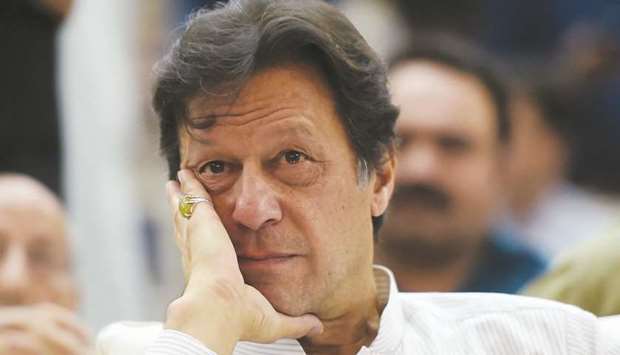Prime Minister Imran Khan’s Pakistan Tehreek-e-Insaf (PTI) suffered a blow in Sunday’s by-elections as the opposition alliance gained five more seats in delicately-balanced National Assembly (NA), further reducing the ruling party’s margin for formation of the federal government.
By-elections were held on total 34 National and provincial assembly seats.
The PTI had a major upset, as voters in two constituencies – NA-131 Lahore and NA-35 Bannu – changed their mind and elected members from opposition parties.
These seats were won by PTI chairman Khan just two months ago in the July 25 general election.
The by-election results have changed the party position in the National Assembly.
Now the opposition numbers have increased by five seats, while the ruling alliance secured six seats.
The PTI number of seats in the National Assembly has increased by four, its ally party, the Pakistan Muslim League – Quaid-e-Azam (PML-Q)’s seats went up by two, the Pakistan Muslim League – Nawaz (PML-N)’s number of seats increased by four, and the Muttahida Majlis-e-Amal (MMA) got one more seat in the NA.
The major setback for the PTI came in NA-131 (Lahore), where PML-N candidate Khwaja Saad Rafique defeated the PTI’s Humayun Akhter Khan.
This seat was vacated by Prime Minister Khan.
In Punjab, the by-elections were held for 11 seats, out of which the PML-N won six, the PTI stood second with three seats, and two seats were won by independents.
In Khyber- Pakhtunkhwa, the PTI won five seats, three went to the Awami National Party (ANP), and the PML-N bagged one seat.
For two Sindh Assembly seats, by-elections were held in PS-30 and PS-87 constituencies, and both were won by the Pakistan People’s Party Parliamentarians (PPPP, the Pakistan Peoples Party’s parliamentary arm).
In Baluchistan, one seat was won by Baluchistan National Party (BAP) while the other was won by an independent.
The by-elections also set a precedent, as overseas Pakistanis who registered were able to cast their votes for the first time.
According to the Election Commission of Pakistan (ECP), 84% of registered overseas voters cast their vote.
It has also been learnt that it was a tough day for the IT officials handling e-voting in Pakistan, as more than 10,000 cyber-attacks were reported on the official website.
However, all the attacks were foiled and the process was completed without any major hindrance.
Elections were held on 24 seats of the Provincial Assemblies: 11 seats of the Punjab Assembly, nine of Khyber Pakhtunkhwa, and two each of Sindh and Baluchistan.
For 11 National Assembly seats, by-elections were held in nine constituencies in Punjab, one in Sindh, and one in Khyber Pakhtunkhwa.
The by-elections come after the national vote on July 25 propelled former World Cup cricketer Khan to power, an outcome that was rejected by the main opposition parties.
Most of the National Assembly seats had been open as Pakistan allows candidates to run in multiple constituencies, but keep only one seat.
The PML-N’s Shahid Khaqan Abbasi, who served as prime minister after Nawaz Sharif was removed from office by the Supreme Court last year, was among those elected to parliament after missing out in the July elections.
The by-elections indicate a dip in popularity for Khan, just two months after his PTI party’s election victory.
Political analysts say Khan’s popularity has suffered due to tough decisions his government has had to take to tackle an economic crisis, including possibly seeking a bailout loan from the International Monetary Fund (IMF).
Meanwhile, the wife of a politician killed in a Taliban suicide attack during campaigning for the July 25 election won her husband’s provincial seat in by-election.
Samar Bilour won the KP Assembly seat that her husband Haroon Bilour, a member of the ANP, had been scheduled to contest in July.
Haroon Bilour was killed along with 19 others in a suicide attack in Peshawar, the provincial capital, claimed by the Pakistani Taliban weeks before the July 25 polls.
The attack prompted a delay in voting for that seat.
His father, senior ANP leader Bashir Bilour, was killed in a suicide bombing in the run-up to Pakistan’s last election in 2013.

Imran Khan: analysts say tough decisions taken by his government affected his party’s by-election performance.
